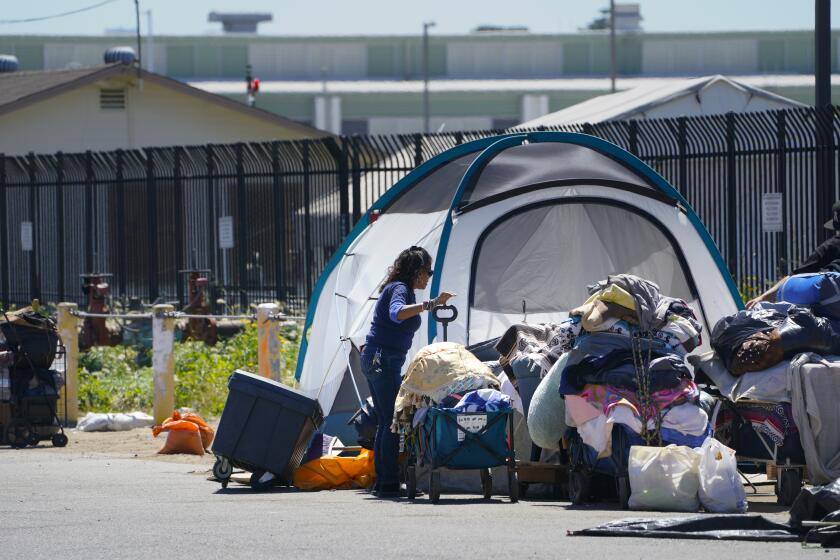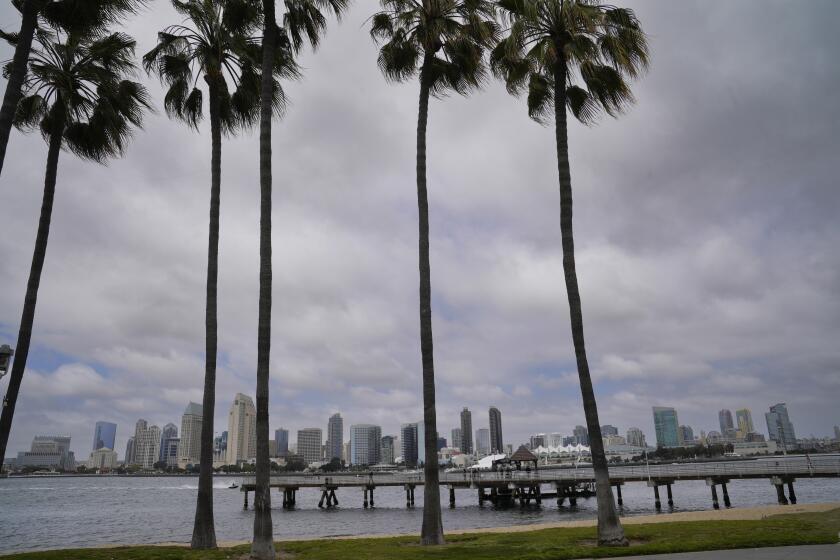Should San Diego City Council take up the $25 service worker minimum wage?

Labor unions are pushing for the city of San Diego to mandate a $25 hourly minimum wage for service workers
Labor unions are pushing for San Diego to mandate a $25 hourly minimum wage for service workers.
Unions representing thousands of hotel, janitorial and convention workers argue that low-paid service employees often have to choose between paying rent or eating in the high-cost city.
There has been a lot of noise so far, with a large rally downtown recently and labor leaders across the state showing support for what would amount to a nearly 50 percent hike in the city’s current minimum wage of $16.85 an hour.
However, no San Diego City Council member has yet agreed to push forward a proposed wage ordinance drafted by a coalition of three local unions.
Q: Should the San Diego City Council take up the $25 service worker minimum wage?
Economists
Kelly Cunningham, San Diego Institute for Economic Research
NO: If wages can be raised to $25 per hour with only positive effects, resulting in minimum wage service workers meeting the prohibitive cost of living, why not raise it to any arbitrary amount, such as $100? Wages actually correlate with the value the job generates. If disconnected from that reality, the work is not sustainable and will disappear. The inevitable outcome will be fewer jobs, higher costs of living and less economic value being generated.
Lynn Reaser, economist
NO: Low-income workers are caught in a vice in San Diego with it being difficult for them to keep up with the cost of living without two jobs in some cases. A wage of $25 an hour, however, may put them out of synchronization with fast-food workers, where the minimum is $20 per hour. A better compromise would be to set the minimum at $23 with an escalator to $25 per hour in four years.
Alan Gin, University of San Diego
YES: The cost of living, especially for housing, is now so high that it is difficult for those with low incomes to live in San Diego. An increase in the minimum wage for service workers would help those workers. There is some concern on the impact on hotels, which are important to San Diego’s tourism industry. Also, in terms of economic efficiency, it is problematic to have a patchwork of minimum wages for different industries, as that might lead to labor imbalances between those industries.
James Hamilton, UC San Diego
NO: Tourism provides significant benefits for the San Diego economy. We’re already doing our best to discourage it with a hefty hotel tax. This would be another body blow to the industry. Businesses would be forced to find ways to eliminate many of these jobs, which will hurt workers and the quality of service that gets provided. This would make San Diego a more expensive and less attractive place to try to live and do business.
Norm Miller, University of San Diego
NO: Government interference only makes sense when there is a clear case of exploitation and market failure. Will we end up with a United Socialist Commission for every sector of the economy to set appropriate wages, and then each commission suggesting they are more important than the others? Doesn’t anyone believe the market works best when unimpeded?
David Ely, San Diego State University
NO: Compensation for service workers should be determined through unions advocating for higher wages and benefits for their members in periodic negotiations with employers. The San Diego City Council should be very cautious about intruding into this process and mandating specific outcomes such as minimum wages. Also, the council should be concerned about taking action that will result in minimum wage differences between service workers and those in other industries.
Ray Major, SANDAG
NO: The tourism industry in San Diego represents a large part of our economy and has not fully recovered from the effects of the pandemic. Increasing the minimum wage to $25 an hour for service workers will create wage push inflation, meaning that higher wages will lead to higher costs. These higher costs, in turn, will lead to higher prices. As prices increase in tourism related businesses, San Diego will become a less desirable place to visit as other alternatives will be comparably cheaper. This will make it even more difficult for the tourism industry to recover from the reductions in tourism related to COVID-19.
Executives
Bob Rauch, R.A. Rauch & Associates
NO: Minimum wage increases hurt the most vulnerable and harm total compensation as employers cut hours, reduce benefits, automate via robotics, or close up business. A minimum wage hike will result in fewer jobs, fewer hours, fewer benefits and fewer consistent hours. It will also destroy teen job opportunities and cause even more inflation. Expanding job opportunities through pro-growth policies will raise wages for all as businesses and individuals prosper. Capitalism, not socialism.
Austin Neudecker, Weave Growth
NO: I approve of general increases to the minimum wage to address wealth disparity. Increases should be state or nationwide, and certainly not industry-specific. The target minimum should be related to a basic quality of life everyone deserves, not your current job. Passing industry-specific wage requirements is a distorting overreach that creates incentives for industry groups and politicians to lobby selfishly. Encourage officials to get this foundational metric right for our collective society, not for industry advocates.
Jamie Moraga, Franklin Revere
NO: Like recent wage increases for fast-food and health care workers, if minimum wage is increased for service workers these costs will be passed on to consumers. The city could also lose business as convention and special event holders may select more affordable cities because San Diego isn’t cost-effective. This lack of affordability continues to drive both residents and businesses out of the state. Legislators shouldn’t dictate industry-specific wage increases; it can have harmful economic consequences.
Haney Hong, San Diego County Taxpayers Association
YES: Yes, only to vote it down. Maybe by talking about it, folks will finally realize that it isn’t low wages that force people to have to pick between rent or eating. It’s the accumulation of the effects of many well-intended policies that make San Diegans’ lives so expensive. Prevailing wage makes housing more expensive. Renewable energy goals mean we have the most expensive electrons. And water reliability means we have the most expensive water. “The road to hell is paved with good intentions.”
Phil Blair, Manpower
NO: I am a strong believer that legislators should not mandate minimum wages for selected industries. In a capitalist system wages should be based on skills, training, attitude and, especially, demand. We already have a very high minimum wage in the city of San Diego that covers all workers. Its not right for fast-food workers or hospitality workers either.
Gary London, London Moeder Advisors
NO: But not because I am philosophically opposed to higher wages. It’s mandated government intervention that is troubling. Certainly, the hotel industry is so strong that they could simply raise room rates to accommodate the increased costs. But maybe it would be better if they just built some rooms or apartments for their employees? Or why can’t they experiment with a system of bonuses to reward output, rather than across-the-board pay raises to reward input/hours worked?
Not participating this week:
Chris Van Gorder, Scripps Health
Caroline Freund, UC San Diego School of Global Policy and Strategy
Have an idea for an Econometer question? Email me at phillip.molnar@sduniontribune.com. Follow me on Threads: @phillip020
Get U-T Business in your inbox on Mondays
Get ready for your week with the week’s top business stories from San Diego and California, in your inbox Monday mornings.
You may occasionally receive promotional content from the San Diego Union-Tribune.









